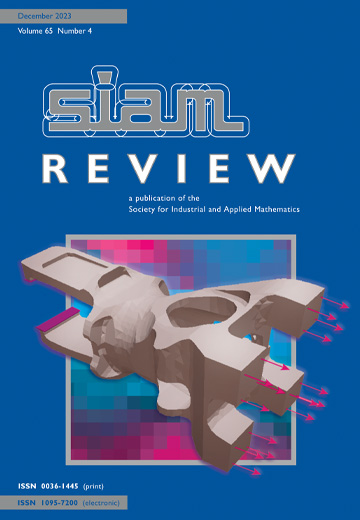评论:;让民主算数:数学如何改善投票、选举地图和代表性
IF 6.1
1区 数学
Q1 MATHEMATICS, APPLIED
引用次数: 0
摘要
SIAM评论,第67卷,第3期,645-650页,2025年8月。民主:数学和民主有什么关系?如果你问一个以前没有研究过这个主题的人,你可能会得到一个明显而简单的答案:我们计票,得票最多的人获胜。好吧。如果你找到一个关注政治的人,你可能会得到另一个答案:我们需要统计数据来进行良好的民意调查并做出预测。更令人满意一点,这是真的,但你可以说,这种类型的分析更多的是对政治过程中谁赢谁输的评论,而不是对过程本身的分析。在最近出版的《让民主有价值:数学如何改善投票、选举地图和代表权》一书中,Ismar voliki给出了另一个答案:数学与民主息息相关。本文章由计算机程序翻译,如有差异,请以英文原文为准。
Featured Review:; Making Democracy Count: How Mathematics Improves Voting, Electoral Maps, and Representation
SIAM Review, Volume 67, Issue 3, Page 645-650, August 2025.
Democracy: What’s math got to do with it? If you were to ask someone who has not previously studied this topic, you’d likely receive the obvious and simple answer: We count votes, and whoever gets the most votes wins. Okay. If you find someone who follows politics, you might get another answer: We need statistics to take good polls and make predictions. A little more satisfying, and true, but you could say that this type of analysis is more commentary on who is winning and losing in the political process rather than an analysis of the process itself. In the recent book Making Democracy Count: How Mathematics Improves Voting, Electoral Maps, and Representation, Ismar Volić gives another answer: Math has everything to do with democracy.
Democracy: What’s math got to do with it? If you were to ask someone who has not previously studied this topic, you’d likely receive the obvious and simple answer: We count votes, and whoever gets the most votes wins. Okay. If you find someone who follows politics, you might get another answer: We need statistics to take good polls and make predictions. A little more satisfying, and true, but you could say that this type of analysis is more commentary on who is winning and losing in the political process rather than an analysis of the process itself. In the recent book Making Democracy Count: How Mathematics Improves Voting, Electoral Maps, and Representation, Ismar Volić gives another answer: Math has everything to do with democracy.
求助全文
通过发布文献求助,成功后即可免费获取论文全文。
去求助
来源期刊

SIAM Review
数学-应用数学
CiteScore
16.90
自引率
0.00%
发文量
50
期刊介绍:
Survey and Review feature papers that provide an integrative and current viewpoint on important topics in applied or computational mathematics and scientific computing. These papers aim to offer a comprehensive perspective on the subject matter.
Research Spotlights publish concise research papers in applied and computational mathematics that are of interest to a wide range of readers in SIAM Review. The papers in this section present innovative ideas that are clearly explained and motivated. They stand out from regular publications in specific SIAM journals due to their accessibility and potential for widespread and long-lasting influence.
 求助内容:
求助内容: 应助结果提醒方式:
应助结果提醒方式:


